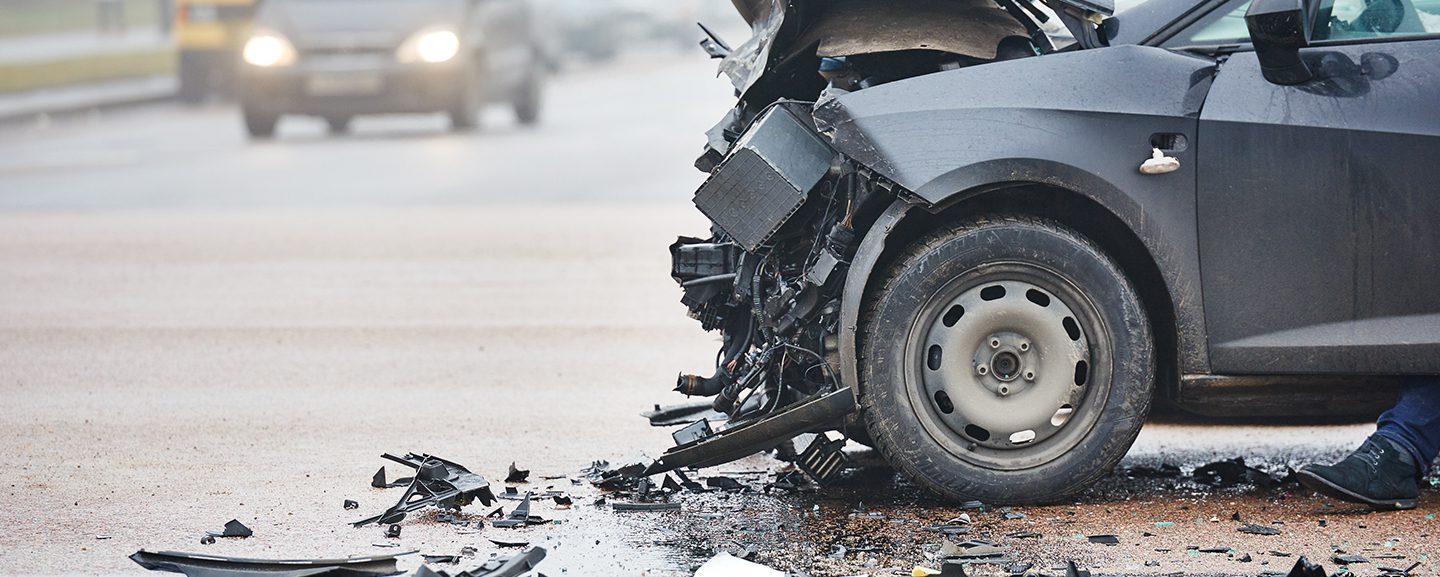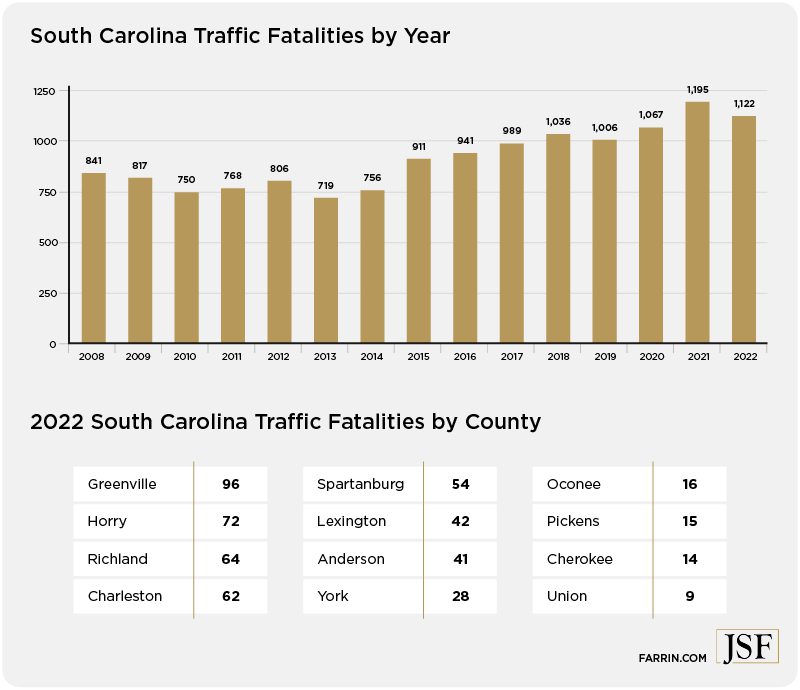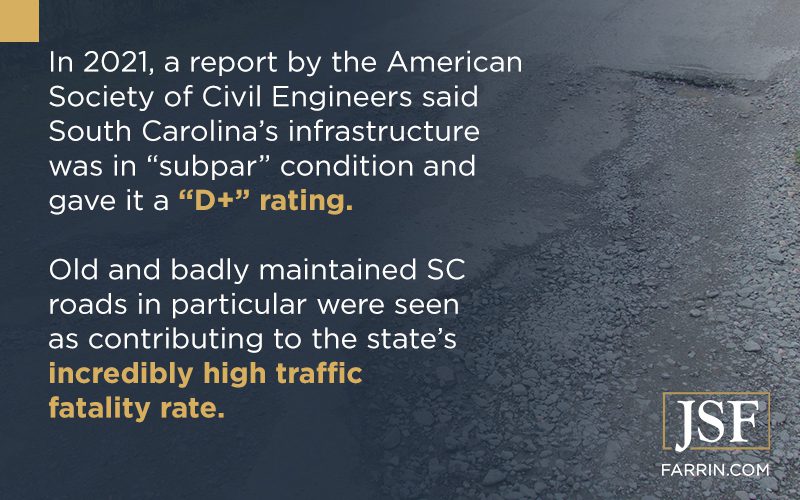Though there has been a recent decline in South Carolina traffic fatalities, SC roads were steadily growing more and more dangerous for 25+ years. Statewide fatality information shows that traffic deaths rose 26% from 1994-2020. That’s the biggest increase by any state in the U.S. over the same time period.
It may relieve you somewhat to know that the number of traffic fatalities in South Carolina declined by 6% from 2021 to 2022. However, this decline is inconsistent from one county to the next. Some counties did indeed experience a significant drop in traffic deaths. Anderson County, for example, saw a 24% decline from 2021 to 2022, and Spartanburg County saw a 33.3% decline. But others, including Greenville, saw the same amount of fatalities or more, offsetting those gains.
Fatal Collisions, Poor Infrastructure: Troubling Highway Safety Statistics in Greenville & SC
Greenville County has experienced a 31.5% increase in traffic deaths since 2019, and it led the state with 96 traffic fatalities in 2022. Greenville County ranks 3rd in traffic deaths by population, trailing Horry and Anderson counties.
Greenville has experienced tremendous population growth over the past decade. The danger of more congested roads is heightened due to poor infrastructure that creates unsafe driving conditions across the state. In 2021, a report by the American Society of Civil Engineers (ASCE) said South Carolina’s infrastructure was in “subpar” condition and gave it a “D+” rating. Old and badly maintained SC roads in particular were seen as contributing to the state’s incredibly high traffic fatality rate.
Little Progress Has Been Made to Address Fatal Collisions in South Carolina
Despite these dangerous conditions, South Carolina has made little progress in making its roads safer. New state legislation proposals are focusing on amending auto insurance policies to increase their limits in the event of bodily injury leading to death. Other possible safety initiatives include penalizing drivers distracted by their phones.
The ASCE’s infrastructure report recommended a minimum investment in South Carolina’s roadways of $70.45 billion by 2040. But the state is only likely to generate $27.63 billion by then according to revenue projection data, leaving a whopping $43 billion gap and nothing behind for other necessary state services.
What Can I Do to Protect Myself on South Carolina Roads?
Due to the dangerous conditions of many South Carolina roads, you may need to take extra care to avoid a serious or even fatal accident or collision. Some helpful driving tips include:
-
- Slow down for workers and work zones, even if there’s no apparent danger, as sudden stops and traffic congestion near work zones can be unexpected.
-
- Drive defensively and avoid aggressive drivers. Avoid conflict on the road and don’t engage with road-ragers.
-
- Prevent your phone from being a distraction by setting it to drive mode or muting it, then ignoring it completely during the drive.
-
- Ensure that your tires have the appropriate level of pressure and don’t have any damage that could result in a blowout or a flat.
-
- Obey speed limits.
-
- Keep your eyes on the road and look out for traffic signs, wildlife, and other warnings or hazards.
-
- Slow down in bad weather such as rain, snow, sleet, and fog to maintain control of your car.
-
- Don’t use cruise control on roads that twist and curve as you may not have enough time to react if the road suddenly changes direction.
Rural roads in South Carolina can be especially dangerous according to the ASCE. Some of the hazards you may encounter while driving in the countryside include:
-
- Roads that twist and turn sharply with blind curves, sudden dips, and unexpectedly steep hills
-
- Long-neglected and badly damaged roads in desperate need of repair, filled with potholes, debris, and other obstacles
-
- Poorly-lit roads that hide the dangers in the darkness
-
- Fallen road signs that fail to warn of impending danger
-
- Narrow roads that squeeze and box you in, making it difficult to maneuver
-
- Roads with no shoulders or guardrails, sometimes flanked by steep embankments
-
- Farm animals and wildlife impeding the road
-
- Slow vehicles taking up the roadway such as large tractors and other farm equipment – South Carolina is home to nearly 25,000 farms
What Can I Do if I’ve Been Injured or if Someone I Love Was Killed in an SC Traffic Accident?
In the unfortunate or tragic circumstance of a wreck leading to your bodily harm or the untimely death of a loved one, you may feel that you have limited options. The at-fault driver’s insurance company may try to make you a lowball settlement offer that doesn’t cover your medical bills or that doesn’t address your personal loss. You don’t have to accept it, nor should you in most cases.
Our team of car accident lawyers is ready to fight for you. Our firm has helped more than 60,000 people recover a total of more than $1.6 billion since 19971. Contact us online for a free case evaluation or call us at 1-866-900-7078 now.
You May Also Be Interested In
Common Types of Car Accidents and Their Consequences
Why Hire a Car Accident Lawyer?
The Importance of a South Carolina Accident Report (and How to Read It)






